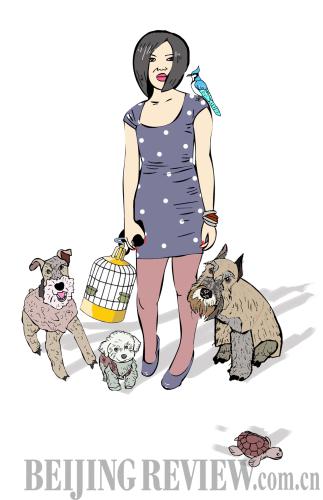|
 |
|
(LI SHIGONG) |
The Chinese love their pets. Little dogs, bird cages and animal markets at every turn demonstrate this devotion in the country's capital. But I must ask: What kind of loving pet owner would dye a poodle in pink stripes? Or shave a chou to make it look like a lion? And would a nation of pet lovers tolerate keeping kittens in noisy, smoky bars? These questions arise on a daily basis, as the Chinese and their pets bring constant bemusement.
What strikes Europeans as odd is the type of dog favored in Beijing. Though small dogs tend to look a bit silly, the ones here go way beyond "a-bit-funny" into "who-could-love-that" territory. Bug-eyed, wide-mouthed, squat, square, waddling monsters wheezing at every breath and taking any chance they can to lie down in the shade as if dead. Even odder, perhaps, are the brave souls who opt for a more European-sized dog. I look forward every evening to seeing the slight, elderly woman who cheerfully carries her enormous golden retriever out of her tiny hutong house and down the road. The dog is so immensely fat that I doubt it can still walk, but its owner never appears to resent taking it on its nightly outings. Further down the road is a husky that is never seen in daylight, presumably as its thick fur is enough to suffocate it in Beijing's afternoon heat. At night it sits by its master's feet, panting pathetically while its owner neglectfully plays cards.
Despite their eccentricities, Beijingers certainly love their misshapen pets. I've seen a man carefully place his podgy pug in the front basket of his bike, and then lovingly photograph it from every angle. A shirtless man cradling a tiny chihuahua atop his beer belly is a common sight, as is a woman walking along with her dog balanced carefully on her outstretched hands and panting with a sort of mad, delighted enthusiasm.
Pets, unlike in Europe, seem to be a passion primarily for adults. It is rare to see young children cuddling rabbits or playing with kittens—instead, pets are for grown-ups, perhaps a middle-aged substitute for now-grown children. While this doesn't diminish the amount they are loved, it does seem to have some effect on their character. Beijing's dogs are often treated with the full love of a baby, even being dressed up and pushed around in buggies and shopping trolleys. Pet fashion is a separate chapter in itself, keeping a multitude of specialized dog hairdressers and stylists in business across Beijing. Animal costumes (of other species), cartoon characters, fur parkas, little boots or sneakers, hats and jewelry are all deemed appropriate gear for little dogs who become important accessories for hip urban Chinese. Cutting, cleaning, blow-drying and dying fur is another necessity for Beijing dog owners, who gladly delegate the task to specialized pet salons, where you may style your pet to look like a rainbow, flower, tiger or panda. These torturous procedures are rarely met with much enthusiasm by their unfortunate victims, who squirm and yap as they are clipped into more pleasing styles. Perhaps deep down a tiny, surviving bit of wolf is howling at the humiliation!
Although dogs are clearly the most favored pets, they are certainly not alone. In subway stations one can buy turtles, snakes, rabbits, hamsters and chipmunks. I've even seen two rather sensible looking businessmen walking a squirrel on a leash beneath skyscrapers in the downtown business district. Unlike deeply beloved dogs, these smaller creatures are seen as little more than a consumer item—nice to look at and cuddle, but when it dies you just buy a new one. My neighbor diligently takes his turtle's tank outside for a few hours each evening to let it enjoy the fresh air, but his turtle was bought from a stack of feebly struggling brothers inside a net on a little trolley. One extreme example is the fishes inside firmly enclosed glass bulbs with an obviously limited lifespan of a few weeks until oxygen and nutrition inside the bubble run out.
Kittens can be bought for a few kuai (yuan)—no questions asked—from shops where they crawl over each other in heaps. These places blur the line between "pet" and "food," supplying both barbeque stalls and the many cat bars found across the city. In spite of the obvious issues of animal rights and food hygiene, these popular bars allow patrons to cuddle cats or kittens while enjoying a drink. Pleasant for the customers, yes, but this means the poor cats live a life of noise and smoke, under constant threat of being fondled by drunken customers. A lot of them seem suspiciously stupefied and I wonder whether sedatives are included in the popular spectator event of daily feeding sessions.
The Chinese approach to pets may remain an enigma for the majority of Westerners, and will surely continue to provide an inexhaustible source of amusement, bewilderment and—not too infrequently-downright shock.
The author is a Briton living in Beijing
Email us at: liuyunyun@bjreview.com
|
